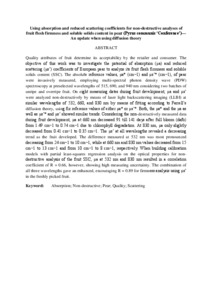Citation
Adebayo, Segun Emmanuel and Hashim, Norhashila and Hass, Roland and Reich, Oliver and Regen, Christian and Munzberg, Marvin and Abdan, Khalina and Hanafi, Marsyita and Zude-Sasse, Manuela
(2017)
Using absorption and reduced scattering coefficients for non-destructive analyses of fruit flesh firmness and soluble solids content in pear (pyrus communis ‘conference’)—an update when using diffusion theory.
Postharvest Biology and Technology, 130.
56 - 63.
ISSN 0925-5214
Abstract
Quality attributes of fruit determine its acceptability by the retailer and consumer. The objective of this work was to investigate the potential of absorption (μa) and reduced scattering (μs’) coefficients of European pear to analyze its fruit flesh firmness and soluble solids content (SSC). The absolute reference values, μa* (cm−1) and μs’* (cm−1), of pear were invasively measured, employing multi-spectral photon density wave (PDW) spectroscopy at preselected wavelengths of 515, 690, and 940 nm considering two batches of unripe and overripe fruit. On eight measuring dates during fruit development, μa and μs’ were analyzed non-destructively by means of laser light backscattering imaging (LLBI) at similar wavelengths of 532, 660, and 830 nm by means of fitting according to Farrell’s diffusion theory, using fix reference values of either μa* or μs’*. Both, the μa* and the μa as well as μs’* and μs’ showed similar trends. Considering the non-destructively measured data during fruit development, μa at 660 nm decreased 91 till 141 days after full bloom (dafb) from 1.49 cm−1 to 0.74 cm−1 due to chlorophyll degradation. At 830 nm, μa only slightly decreased from 0.41 cm−1 to 0.35 cm−1. The μs’ at all wavelengths revealed a decreasing trend as the fruit developed. The difference measured at 532 nm was most pronounced decreasing from 24 cm−1 to 10 cm−1, while at 660 nm and 830 nm values decreased from 15 cm−1 to 13 cm−1 and from 10 cm−1 to 8 cm−1, respectively. When building calibration models with partial least-squares regression analysis on the optical properties for non-destructive analysis of the fruit SSC, μa at 532 nm and 830 nm resulted in a correlation coefficient of R = 0.66, however, showing high measuring uncertainty. The combination of all three wavelengths gave an enhanced, encouraging R = 0.89 for firmness analysis using μs’ in the freshly picked fruit.
Download File
![[img]](http://psasir.upm.edu.my/63658/1.hassmallThumbnailVersion/Using%20absorption%20and%20reduced%20scattering%20coefficients%20for%20non-destructive%20analyses%20of%20fruit%20flesh%20firmness%20.pdf)  Preview |
|
Text (Abstract)
Using absorption and reduced scattering coefficients for non-destructive analyses of fruit flesh firmness .pdf
Download (194kB)
| Preview
|
|
Additional Metadata
Actions (login required)
 |
View Item |

